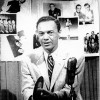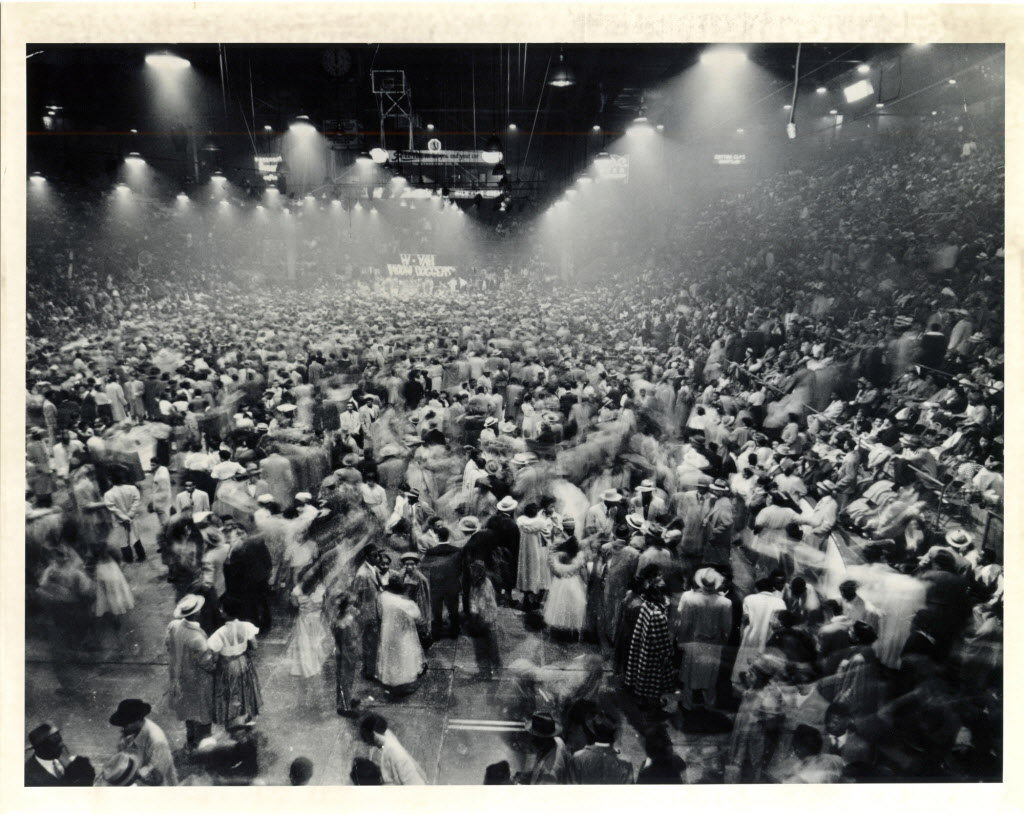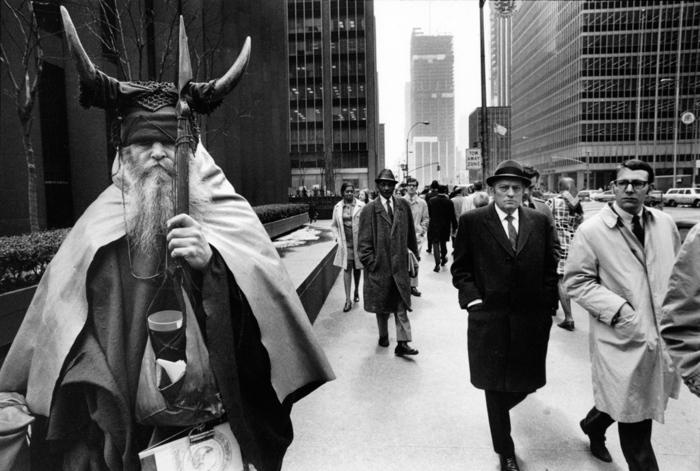It looks like you're using an Ad Blocker.
Please white-list or disable AboveTopSecret.com in your ad-blocking tool.
Thank you.
Some features of ATS will be disabled while you continue to use an ad-blocker.
5
share:
Let's rewind the clock 67 years and place ourselves in 1951 America. Reeling from the horrors of WWII, Americans are desperate to project and believe
in a wholesome image. TV and radio, however, are dominated by white Americans, and the tension that naturally arises from brutal oppression is
building in the South. The two faces of America are incongruous; the wholesome image duplicitous. America is ripe for radical change, which comes as
no surprise considering the conditions; however, the form that change initially took is somewhat astonishing.
Enter Leo Mintz and Alan Freed.

Leo Mintz, the owner of Record Rendezvous Store (The Vouz) in Cleveland Ohio, played an essential part in the integration of what had previously been known as “race music” (not kidding) into mainstream society and radio. Radio was going to have to rely on the music industry if it were going to survive against its younger and more attractive new rival (television), and Leo Mintz recognized the mutual benefit of introducing music from his store to the radio waves. He approached a young disk jockey Alan Freed with the idea of introducing “race music” to a major radio outlet. Thus, on an early summer evening in 1951, Mintz sponsored the first Moon Dog House Party, a late night radio show in which he and Freed introduced the music (R&B) which was about to take America by storm by desegregating the entertainment realm and enabling the citizens to follow suit.
Below is a link to one of Freed's shows (1954):
blog.cleveland.com...
Moondog Coronation Ball

America’s first rock ‘n’ roll concert was an idea of Alan Freed's, named after a record by the Vees, and ended in the chaos which would later come to define the genre (guitar smashing, bat head biting fun). In March of 1952, (as a result of counterfeit tickets and a printing error) 20,000 people showed up with tickets to a "dance" in an arena designed to hold 10,000. The crowd broke through the barricaded doors and the concert had to be shut down immediately. Freed was quoted saying “If anyone ... had told us that some 20,000 or 25,000 people would try to get into a dance — I suppose you would have been just like me. You would have laughed and said they were crazy".
ultimateclassicrock.com...
Enter Moondog

From 1951-1954, Alan Freed broadcast through the airwaves as Moondog. He would commonly refer to himself and fellow R&B fans as Moondoggers, and the music itself as rock 'n' roll (this wasn't unheard of at the time, exactly, but had yet to be used to define a genre of music). The name Moondog might have originated from the name of a record by the Vees, but Freed used a song called Moondog Symphony to introduce his show, and the author of the Moondog Symphony was also named Moondog (a character worthy of his own thread for sure). In 1955, Moondog the musician took Alan Freed to court and won. Freed could no longer use Moondog's name or music in his show. Read more about Moondog, the homeless musical genius who dressed like a Viking and played his music for free on the streets of New York here (Janice Joplin covered his music and many big names took notice):
priceonomics.com...
Rock 'n' Roll Dance Party
Freed, not to be discouraged, continued his show under a new name, Rock n Roll Dance Party and thus the term Rock 'n' Roll was applied to R&B music and marketed as such to the masses. Of course, like any raucous party, Freed drew the attention of authoritatian types who don't like to see people having fun together, and began to amass a strong opposition. He was accused of corrupting the youth, he drew the ire of evangelicals and government officials alike. In 1957, Freed was given TV airtime by means of a dance show he called Big Beat, but the show was shut down after two airings due to an unbearable scandal-- black singer Franki Lymon danced with a white girl on air (gasp). The show aired again in 1959, by which time the tides of change were too strong to hold back!
Check out this amazing footage from one of those dance parties here:
Thank you for reading! Additional sources here:
www.alanfreed.com...
articles.latimes.com...
www.allaboutbluesmusic.com...
en.wikipedia.org...
Enter Leo Mintz and Alan Freed.

Leo Mintz, the owner of Record Rendezvous Store (The Vouz) in Cleveland Ohio, played an essential part in the integration of what had previously been known as “race music” (not kidding) into mainstream society and radio. Radio was going to have to rely on the music industry if it were going to survive against its younger and more attractive new rival (television), and Leo Mintz recognized the mutual benefit of introducing music from his store to the radio waves. He approached a young disk jockey Alan Freed with the idea of introducing “race music” to a major radio outlet. Thus, on an early summer evening in 1951, Mintz sponsored the first Moon Dog House Party, a late night radio show in which he and Freed introduced the music (R&B) which was about to take America by storm by desegregating the entertainment realm and enabling the citizens to follow suit.
Below is a link to one of Freed's shows (1954):
blog.cleveland.com...
Moondog Coronation Ball

America’s first rock ‘n’ roll concert was an idea of Alan Freed's, named after a record by the Vees, and ended in the chaos which would later come to define the genre (guitar smashing, bat head biting fun). In March of 1952, (as a result of counterfeit tickets and a printing error) 20,000 people showed up with tickets to a "dance" in an arena designed to hold 10,000. The crowd broke through the barricaded doors and the concert had to be shut down immediately. Freed was quoted saying “If anyone ... had told us that some 20,000 or 25,000 people would try to get into a dance — I suppose you would have been just like me. You would have laughed and said they were crazy".
ultimateclassicrock.com...
Enter Moondog

From 1951-1954, Alan Freed broadcast through the airwaves as Moondog. He would commonly refer to himself and fellow R&B fans as Moondoggers, and the music itself as rock 'n' roll (this wasn't unheard of at the time, exactly, but had yet to be used to define a genre of music). The name Moondog might have originated from the name of a record by the Vees, but Freed used a song called Moondog Symphony to introduce his show, and the author of the Moondog Symphony was also named Moondog (a character worthy of his own thread for sure). In 1955, Moondog the musician took Alan Freed to court and won. Freed could no longer use Moondog's name or music in his show. Read more about Moondog, the homeless musical genius who dressed like a Viking and played his music for free on the streets of New York here (Janice Joplin covered his music and many big names took notice):
priceonomics.com...
Rock 'n' Roll Dance Party
Freed, not to be discouraged, continued his show under a new name, Rock n Roll Dance Party and thus the term Rock 'n' Roll was applied to R&B music and marketed as such to the masses. Of course, like any raucous party, Freed drew the attention of authoritatian types who don't like to see people having fun together, and began to amass a strong opposition. He was accused of corrupting the youth, he drew the ire of evangelicals and government officials alike. In 1957, Freed was given TV airtime by means of a dance show he called Big Beat, but the show was shut down after two airings due to an unbearable scandal-- black singer Franki Lymon danced with a white girl on air (gasp). The show aired again in 1959, by which time the tides of change were too strong to hold back!
Check out this amazing footage from one of those dance parties here:
Thank you for reading! Additional sources here:
www.alanfreed.com...
articles.latimes.com...
www.allaboutbluesmusic.com...
en.wikipedia.org...
edit on 7-2-2018 by zosimov because: (no reason given)
edit on 7-2-2018 by zosimov because: (no reason given)
Fine thread zos. Though I am familiar with most of that history, having lived very close to it, one major point had escaped me. That was the nature
of one entrenched capitalist form of enterprise (radio) realizing it needed to reorganize or die while being faced by newer technology.(television).
It needed a broader consumer base.
Most people think of Elvis as the ''King'' of rock and roll. No discredit to Elvis's skills and talent, but he was more than that in the play of racial integration. As the rock and roll phenomena blossomed and began to consume the youth of the early 50s, one of the changes to youth culture was the integration mentioned in your thread. Young white teenagers and pre-teens began to squirm and jiggle like ''the black folk'' they were hearing on the radio. This was unacceptable to a large percentage of white American culture whose children wanted to listen to RB and Boogie music as preformed by black musicians such as Chuck Berry and Little Richard.
Colonel Tom Parker noticed this need. By the mid 50s he began to look for a white entertainer who could jiggle and gyrate, sing and perform in the same manner but because of his color would be more acceptable to all those white parents who would not stand for their teenage daughters hanging posters of black men in their bedrooms. Elvis was the answer to that and the rest is history. Simple economics.
Most people think of Elvis as the ''King'' of rock and roll. No discredit to Elvis's skills and talent, but he was more than that in the play of racial integration. As the rock and roll phenomena blossomed and began to consume the youth of the early 50s, one of the changes to youth culture was the integration mentioned in your thread. Young white teenagers and pre-teens began to squirm and jiggle like ''the black folk'' they were hearing on the radio. This was unacceptable to a large percentage of white American culture whose children wanted to listen to RB and Boogie music as preformed by black musicians such as Chuck Berry and Little Richard.
Colonel Tom Parker noticed this need. By the mid 50s he began to look for a white entertainer who could jiggle and gyrate, sing and perform in the same manner but because of his color would be more acceptable to all those white parents who would not stand for their teenage daughters hanging posters of black men in their bedrooms. Elvis was the answer to that and the rest is history. Simple economics.
a reply to: TerryMcGuire
Thank you for adding that interesting facet to the story! The integral role music played in shaping American history is incredible.
Thank you for adding that interesting facet to the story! The integral role music played in shaping American history is incredible.
edit on 7-2-2018 by zosimov because: (no reason given)
We were aware of Mr. Freed but in Texas we were aficionados of XERF a powerful Mexican station and the incredible Wolfman Jack.
a reply to: zosimov
I discovered Moondog while digging for samples about 6 months ago. Dude was blind since 16 if I remember correctly and a homeless street musician who eventually moved to Germany and walked around with a big gandalf type stick.
That last part I remember from a comment on a YouTube video of one of his songs. It was by a woman who ran into him on the street over there.
He got around for a blind person back in those days.
I discovered Moondog while digging for samples about 6 months ago. Dude was blind since 16 if I remember correctly and a homeless street musician who eventually moved to Germany and walked around with a big gandalf type stick.
That last part I remember from a comment on a YouTube video of one of his songs. It was by a woman who ran into him on the street over there.
He got around for a blind person back in those days.
a reply to: underwerks
You're right, he was blinded as a youth (picked up an explosive he found) and did end up in Germany looking a lot like Gandalf!
He returned once to New York to conduct his own symphony on an invite from the Brooklyn's Philharmonic Chamber Orchestra, but returned to Germany for the remainder of his life.
(I got all this info from that article I linked in OP)
Interesting guy and incredible musician!
You're right, he was blinded as a youth (picked up an explosive he found) and did end up in Germany looking a lot like Gandalf!
He returned once to New York to conduct his own symphony on an invite from the Brooklyn's Philharmonic Chamber Orchestra, but returned to Germany for the remainder of his life.
(I got all this info from that article I linked in OP)
Interesting guy and incredible musician!
edit on 7-2-2018 by zosimov because: (no reason given)
originally posted by: zosimov
a reply to: underwerks
You're right, he was blinded as a youth (picked up an explosive he found) and did end up in Germany looking a lot like Gandalf!
He returned once to New York to conduct his own symphony on an invite from the Brooklyn's Philharmonic Chamber Orchestra, but returned to Germany for the remainder of his life.
(I got all this info from that article I linked in OP)
Interesting guy and incredible musician!
That's crazy, I didn't know he was blinded by an explosive device. WTH?
a reply to: underwerks
Text
Crazy, I know! Here's a quote from the article (you were right- he was 16)
Toward the tail end of his time in Missouri, on the 4th of July, Hardin, then 16, came across a curious, cylindrical object out in the fields and began to toss it around. Hardin’s momentary curiosity would change the course of his life: the object, a dynamite cap, exploded in his face, and he was permanently blinded.
priceonomics.com...
Did you find any samples to use?
a reply to: olaru12
From my memory, Wolfman Jack came at at time after Freed. We used to listen to him in San Francisco over xerb. I recall that he was broadcasting out of Mexico and so had transmitters more powerful than were allowed in the US at the time. There were rumors that he was aboard a ship off the coast and also exempt from normal broadcasting restrictions.
From my memory, Wolfman Jack came at at time after Freed. We used to listen to him in San Francisco over xerb. I recall that he was broadcasting out of Mexico and so had transmitters more powerful than were allowed in the US at the time. There were rumors that he was aboard a ship off the coast and also exempt from normal broadcasting restrictions.
a reply to: TerryMcGuire
The research I did for this post suggested that Hunter Hancock (and some smaller stations, one in Nashville) was playing R&B on air as early as 1948, then came Freed but to a broader audience, then on to Wolfman etc...
Such interesting times in music history!
Here's an article about Hancock, in case anyone is interested:
articles.latimes.com...
The research I did for this post suggested that Hunter Hancock (and some smaller stations, one in Nashville) was playing R&B on air as early as 1948, then came Freed but to a broader audience, then on to Wolfman etc...
Such interesting times in music history!
Here's an article about Hancock, in case anyone is interested:
articles.latimes.com...
new topics
-
Thanksgiving 2024
Member Art: 3 hours ago -
The art of being offended
Social Issues and Civil Unrest: 5 hours ago -
FLORIDA Sues Biden-Harris FEMA for Denying Disaster Assistance to Homeowners with TRUMP Signs.
US Political Madness: 5 hours ago -
Turns out, they planned to go after P-nut.
US Political Madness: 9 hours ago
top topics
-
Turns out, they planned to go after P-nut.
US Political Madness: 9 hours ago, 20 flags -
The art of being offended
Social Issues and Civil Unrest: 5 hours ago, 15 flags -
FLORIDA Sues Biden-Harris FEMA for Denying Disaster Assistance to Homeowners with TRUMP Signs.
US Political Madness: 5 hours ago, 12 flags -
Sick sick sick ---graphic story
Social Issues and Civil Unrest: 15 hours ago, 7 flags -
Thanksgiving 2024
Member Art: 3 hours ago, 3 flags
active topics
-
FLORIDA Sues Biden-Harris FEMA for Denying Disaster Assistance to Homeowners with TRUMP Signs.
US Political Madness • 28 • : xuenchen -
WATCH LIVE: US Congress hearing on UFOs, unidentified anomalous phenomena
Aliens and UFOs • 50 • : putnam6 -
Thanksgiving 2024
Member Art • 5 • : BingoMcGoof -
The Acronym Game .. Pt.4
General Chit Chat • 952 • : JJproductions -
HHS Spent Hundreds of Millions of Dollars on DEI Initiatives Under Biden, Watchdog Finds
US Political Madness • 7 • : VariedcodeSole -
The art of being offended
Social Issues and Civil Unrest • 21 • : Kaiju666 -
Should we look for the truth, or just let it go?
US Political Madness • 120 • : chr0naut -
Elon's Starlink Stole The Election For Trump--Leftist Conspiracy Theorists Charge
General Conspiracies • 43 • : ADVISOR -
Turns out, they planned to go after P-nut.
US Political Madness • 26 • : Dalamax -
President-elect TRUMP Picks MATT GAETZ for his ATTORNEY GENERAL - High Level PANIC Ensues.
2024 Elections • 56 • : fringeofthefringe
5
